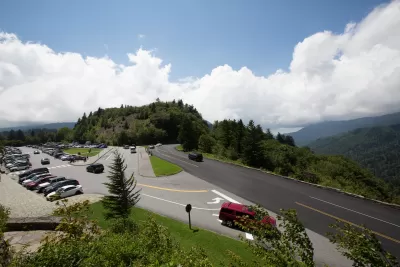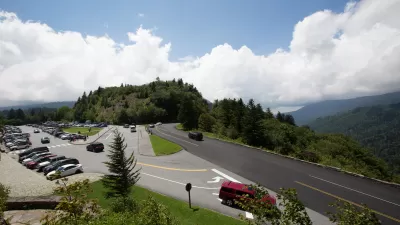Visitors to the nation’s busiest national park will soon have to pay to park under a plan announced today by park officials.

Kristy Kepley-Steward reports for ABC 13 News that Great Smokey Mountains National Park officials have announced the decision to adopt the “Pay it Forward” parking tag program under consideration since the spring.
“Parking tags will be required to be displayed on any motor vehicle parked within the park boundary beginning March 1, 2023. Approved parking rates are $5 for a daily parking tag, $15 for a parking tag for up to seven days, and $40 for an annual parking tag,” writes Kepley-Steward.
Much like an urban parking district, revenues raised by the Pay it Forward program will be used for capital improvement projects to improve visitor experience, protect resources, and maintain trails, roads, historic structures, and facilities, according to the article.
Details on the public outreach program that led to the decision to adopt the program are included in the source article.
FULL STORY: Great Smokies announce parking tag program, increased fees

Planetizen Federal Action Tracker
A weekly monitor of how Trump’s orders and actions are impacting planners and planning in America.

Restaurant Patios Were a Pandemic Win — Why Were They so Hard to Keep?
Social distancing requirements and changes in travel patterns prompted cities to pilot new uses for street and sidewalk space. Then it got complicated.

Map: Where Senate Republicans Want to Sell Your Public Lands
For public land advocates, the Senate Republicans’ proposal to sell millions of acres of public land in the West is “the biggest fight of their careers.”

Maui's Vacation Rental Debate Turns Ugly
Verbal attacks, misinformation campaigns and fistfights plague a high-stakes debate to convert thousands of vacation rentals into long-term housing.

San Francisco Suspends Traffic Calming Amidst Record Deaths
Citing “a challenging fiscal landscape,” the city will cease the program on the heels of 42 traffic deaths, including 24 pedestrians.

California Homeless Arrests, Citations Spike After Ruling
An investigation reveals that anti-homeless actions increased up to 500% after Grants Pass v. Johnson — even in cities claiming no policy change.
Urban Design for Planners 1: Software Tools
This six-course series explores essential urban design concepts using open source software and equips planners with the tools they need to participate fully in the urban design process.
Planning for Universal Design
Learn the tools for implementing Universal Design in planning regulations.
Heyer Gruel & Associates PA
JM Goldson LLC
Custer County Colorado
City of Camden Redevelopment Agency
City of Astoria
Transportation Research & Education Center (TREC) at Portland State University
Camden Redevelopment Agency
City of Claremont
Municipality of Princeton (NJ)





























